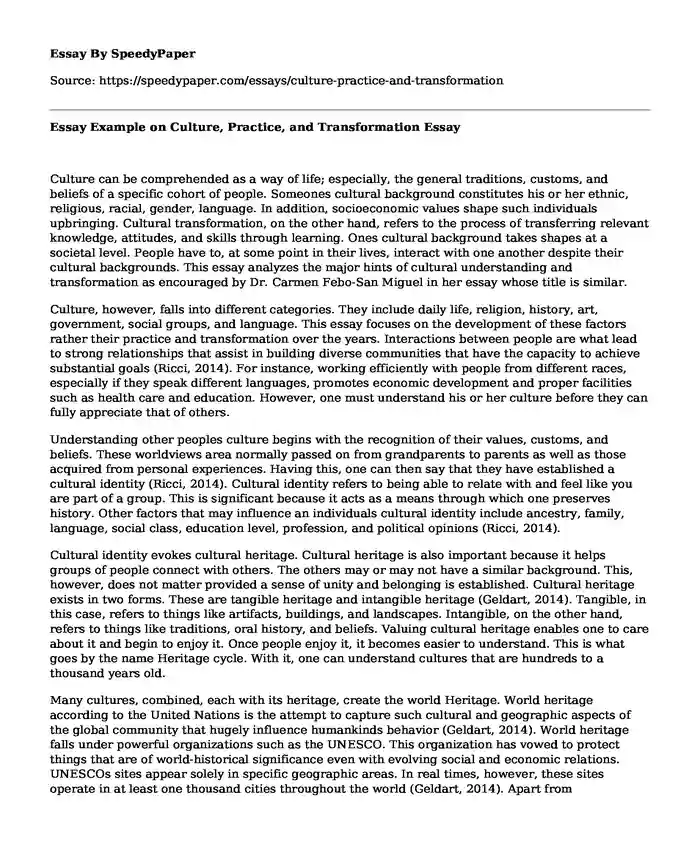Culture can be comprehended as a way of life; especially, the general traditions, customs, and beliefs of a specific cohort of people. Someones cultural background constitutes his or her ethnic, religious, racial, gender, language. In addition, socioeconomic values shape such individuals upbringing. Cultural transformation, on the other hand, refers to the process of transferring relevant knowledge, attitudes, and skills through learning. Ones cultural background takes shapes at a societal level. People have to, at some point in their lives, interact with one another despite their cultural backgrounds. This essay analyzes the major hints of cultural understanding and transformation as encouraged by Dr. Carmen Febo-San Miguel in her essay whose title is similar.
Culture, however, falls into different categories. They include daily life, religion, history, art, government, social groups, and language. This essay focuses on the development of these factors rather their practice and transformation over the years. Interactions between people are what lead to strong relationships that assist in building diverse communities that have the capacity to achieve substantial goals (Ricci, 2014). For instance, working efficiently with people from different races, especially if they speak different languages, promotes economic development and proper facilities such as health care and education. However, one must understand his or her culture before they can fully appreciate that of others.
Understanding other peoples culture begins with the recognition of their values, customs, and beliefs. These worldviews area normally passed on from grandparents to parents as well as those acquired from personal experiences. Having this, one can then say that they have established a cultural identity (Ricci, 2014). Cultural identity refers to being able to relate with and feel like you are part of a group. This is significant because it acts as a means through which one preserves history. Other factors that may influence an individuals cultural identity include ancestry, family, language, social class, education level, profession, and political opinions (Ricci, 2014).
Cultural identity evokes cultural heritage. Cultural heritage is also important because it helps groups of people connect with others. The others may or may not have a similar background. This, however, does not matter provided a sense of unity and belonging is established. Cultural heritage exists in two forms. These are tangible heritage and intangible heritage (Geldart, 2014). Tangible, in this case, refers to things like artifacts, buildings, and landscapes. Intangible, on the other hand, refers to things like traditions, oral history, and beliefs. Valuing cultural heritage enables one to care about it and begin to enjoy it. Once people enjoy it, it becomes easier to understand. This is what goes by the name Heritage cycle. With it, one can understand cultures that are hundreds to a thousand years old.
Many cultures, combined, each with its heritage, create the world Heritage. World heritage according to the United Nations is the attempt to capture such cultural and geographic aspects of the global community that hugely influence humankinds behavior (Geldart, 2014). World heritage falls under powerful organizations such as the UNESCO. This organization has vowed to protect things that are of world-historical significance even with evolving social and economic relations. UNESCOs sites appear solely in specific geographic areas. In real times, however, these sites operate in at least one thousand cities throughout the world (Geldart, 2014). Apart from encouraging local populations to preserve cultural heritage, world heritage is greatly important because it promotes cultural locations as belonging to everyone.
References
Geldart, P. (2014). Culture Transformation: Purpose, Passion, Path. Seaford : Eagle's Flight
Ricci, G. R. (2014). Travel, discovery, transformation. New Brunswick: Transaction Publishers.
Cite this page
Essay Example on Culture, Practice, and Transformation. (2019, Jun 13). Retrieved from https://speedypaper.net/essays/culture-practice-and-transformation
Request Removal
If you are the original author of this essay and no longer wish to have it published on the SpeedyPaper website, please click below to request its removal:
- Mandatory Vaccination Essay Sample
- Literary Essay Sample: Martian Analysis
- Dial-Up Internet Obituary, Free Essay Sample
- Essay Sample Dedicated to Effective Business Communication
- Essay Sample on Thrombocytosis Differential Diagnosis
- Essay Sample on the Socratic Method
- Free Essay Example - Hindu Temples
Popular categories





